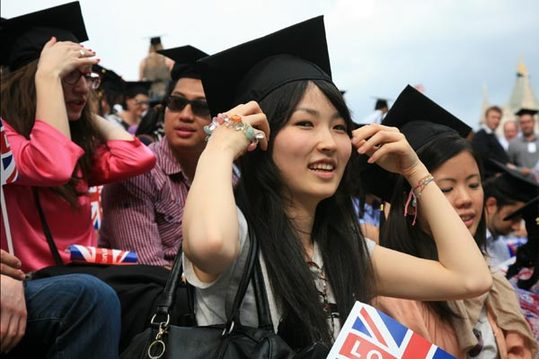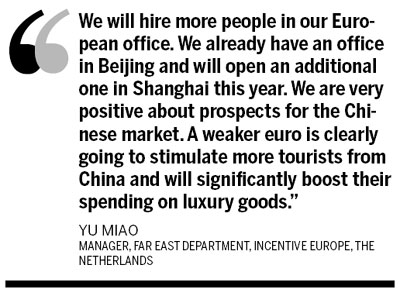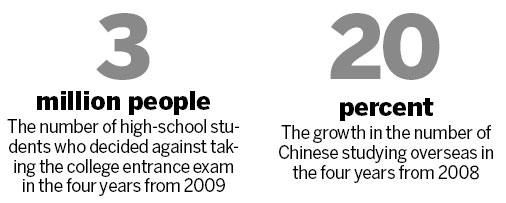

|
 |
|
Chinese students at a gathering of overseas students in London. Britain and France are major destinations in Europe for academic study for students from Asian countries because they have many prestigious universities and colleges. Among overseas students in Europe, those from China make up the majority, prompted by the euro's devaluation against the yuan. [Photo/China Daily] |
Chinese visitors to the eurozone get much more for their money
Computer science major student Zhang Yuqing, 19, decided to quit her college in Beijing this year and apply to one of the grandes ecoles in France, an idea inspired by the weakening of the euro.
She will be making a big saving - at least 10,000 yuan ($1,587) a year.
The prestigious higher education institutions in France, to which she has applied, usually cost annually 100,000 yuan in tuition fees and another 100,000 yuan in living expenses, Zhang said. It takes a minimum of six years to complete the bachelor and master degrees she has been longing for.
"Given the high costs, any decrease in the euro is good news," said Zhang.
The sharp drop in the value of the euro will be a great encouragement to Chinese students pursuing higher education in eurozone countries, said Wang Yue, a tutor at Neworiental Corporation Beijing. She said the depreciation of the European currency has reduced tuition fees and living costs.
"Studying at the same school, the expenses are 20 percent lower than the year before," she said.
In European countries, most colleges charge no tuition fee.
The lowering exchange rate of the euro to the yuan will further reduce living expenses in Europe, said Wang Zhenyu, programmer officer of the European Union Delegation in China.
EU countries are one of the leading destinations for Chinese students studying abroad and the number of Chinese students in European schools is on the rise.
For example, Frank Hartmann, press counsellor of the German Embassy in Beijing, said because of the attractiveness of tertiary education at German universities in subjects such as science and engineering, over the last couple of years, the number of Chinese students in Germany has been increasing.
With 28,000 university students in Germany, Chinese students form the largest foreign student community in Germany, Hartmann said.
Currency movements are usually temporary. The real criteria for attracting students is academic excellence, which has a long-lasting effect, Wang of the EU Delegation said.
Chinese freshman Zhang Yuqing chose Europe over schools in China for a better education and more rosy employment prospects.
"Many of my classmates here spend too much time on social networking websites and do not have a clue what they will do afterward," Zhang said. "I want to be more prepared for a job when I graduate from college. I believe Paris can teach me that."
About 9.15 million people took the country's national college entrance exam last week, a decrease of 180,000 people compared with last year. It is the fourth consecutive reduction in the number of applicants since 2009, the Legal Evening News reported, quoting the data of the Ministry of Education.
Nearly 3 million high-school students in these four years decided against taking the exam, which started on Thursday, the paper said.
On the other hand, the number of Chinese studying overseas has grown in four consecutive years since 2008, an annual increase of more than 20 percent.
In 2011, the number reached a record high of 350,000 people, according to the 2012 National College Entrance Exam Report.
The report, published by eol.cn, has found that of those studying abroad in 2011, nearly half pursued a college education. It is estimated about 20 percent of these who gave up the national college entrance exam chose to study abroad, said the paper.
The same website published a report on trends of Chinese studying abroad in 2011, showing that the number of Chinese pursuing undergraduate education will continue to grow, taking up about 60 percent of the overall number of overseas Chinese students.
Difficulties in excelling in the national college entrance exam and doubts over the quality of college education on the Chinese mainland are held responsible for the increase in young Chinese students going abroad, professor Xiong Bingqi of Shanghai Jiao Tong University was quoted as saying by the Legal Evening News.
Tourism
Fewer European tourists may decide to spend their summer vacations in countries such as Greece because the ongoing eurozone crisis and political uncertainties have tightened wallets across Europe.
However, the surge in Chinese tourists to Europe this summer is offering a ray of sunshine amid the region's gloomy economic outlook.
"Our business catering for European tourists is shrinking but that has been offset by the fast-growing number of incoming Chinese tourists," said Chen Chaoying, general manager of travel agency Mandarin Voyages in Paris, France.
Travel companies in Europe expect the rising value of the Chinese currency against the euro will further boost tourism from China and the spending power of cash-rich Chinese tourists.
Tian Yuan, a 27-year-old resident of Beijing, is busy planning her honeymoon in Greece and Italy this month.
"A weaker euro is definitely a reason that my husband and I decided to travel to Europe," Tian said. "It means everything will be cheaper than before although Greece might not be as stable as it was because of the crisis."
Hartmann, from Germany's Beijing embassy, said the trend of increasing numbers of Chinese tourists visiting Germany has been very positive over the last few years.
Compared with June 2011, the euro has lowered by roughly 15 percent, said Oliver Sedlinger, director of marketing and sales in Beijing at the German National Tourist Office.
He believes that the favorable exchange rate will further increase the already growing interest in trips to Europe and especially boost travel to Germany.
"In the first three months of this year, we saw an increase of 20.8 percent compared with 2011," Sedlinger said.
The number of overnight stays by Chinese travelers in Germany over the last five years show a massive increase, from 950,000 in 2007 to a new record of 1.32 million in 2011. "For the first time, China overtook Japan as Germany's most important source market in Asia," he said.
Taking advantage of China's booming tourist market, travel agencies in Europe are increasing investment in their China business departments to attract more Chinese tourists and business groups.
"We will hire more people in our European office. We already have an office in Beijing and will open an additional one in Shanghai this year," said Yu Miao, manager of the Far East department of Incentive Europe, a travel agency in the Netherlands.
"We are very positive about prospects for the Chinese market. A weaker euro is clearly going to stimulate more tourists from China and will significantly boost their spending on luxury goods," Yu said.
Yu's company recorded revenue of 3.5 million euros ($4.38 million) from the Chinese market in 2011. He expects the number to grow by 20 percent this year.
With the rising affluent class in China and their growing purchasing power, the demands of Chinese tourists are changing.
"They used to spend the minimum money and visit the most places but now Chinese tourists are not satisfied with simply taking photos and shopping. They want good quality and better services," Yu said.
"So travel products such as a multi-day tour of southern France or a tour of French wine chateaus are becoming increasingly popular," he added.
High-end business groups from China are also becoming a major source of profit for travel agencies.
"There are many large-scale meetings and exhibitions held in Europe every year, which guarantees a stable source of business groups from China," said Wang Yan, a senior account manager with China Comfort Travel Co in Beijing.
"Capital-rich Chinese companies in the auto, medical and mining industries often organize incentive trips to Europe for their employees. This type of demand is also growing very fast," Wang said.
Meanwhile, the boom in the Chinese tourism market is raising competition between travel agencies to a point more intense than ever before. Foreign travel companies in China are also eyeing a slice of the lucrative Chinese tourism market.
"We've seen increasing competition from European travel companies such as the German company TUI Travel Plc which has done well in terms of attracting Chinese business groups and tourists," Wang said.
Paul Bunsell, first secretary from the trade section at the EU Delegation, said it is too early to tell whether the fluctuations in the value of the euro against the yuan will have a long-lasting impact on tourism flows to the European Union from China.
Bunsell hopes to encourage more European travel agencies and tour operators to engage in China's outbound travel market, resulting in a longer lasting and more predictable scenario.
Contact the writers at wang zhuoqiong@chinadaily.com.cn and lixiang@chinadaily.com.cn


 New wind power group sprouts up in Chongqing
New wind power group sprouts up in Chongqing
 Top 5 online rumors of latest iPhone
Top 5 online rumors of latest iPhone
 A glimpse of former Shougang industrial site
A glimpse of former Shougang industrial site
 Robot waiter introduced to restaurant in South China
Robot waiter introduced to restaurant in South China
 Qingdao gets ready for huge beer festival in China
Qingdao gets ready for huge beer festival in China
 Top 9 automobile recalls in H1 in China
Top 9 automobile recalls in H1 in China
 Disabled veteran carves out success on Internet
Disabled veteran carves out success on Internet
 Top 10 regions with highest GDP growth
Top 10 regions with highest GDP growth
 Caixin China manufacturing PMI falls to two-year low
Caixin China manufacturing PMI falls to two-year low
 China official manufacturing PMI falls to 50.0 in July, below forecasts
China official manufacturing PMI falls to 50.0 in July, below forecasts